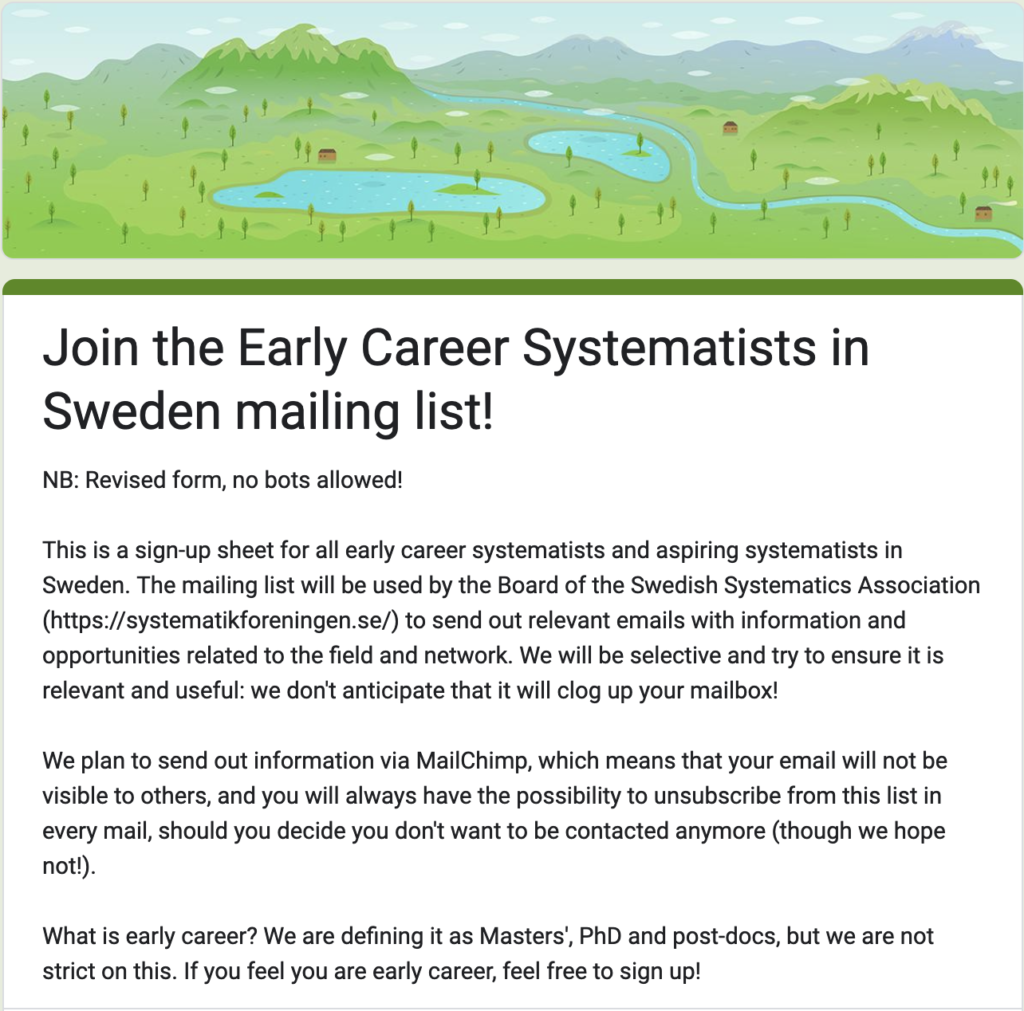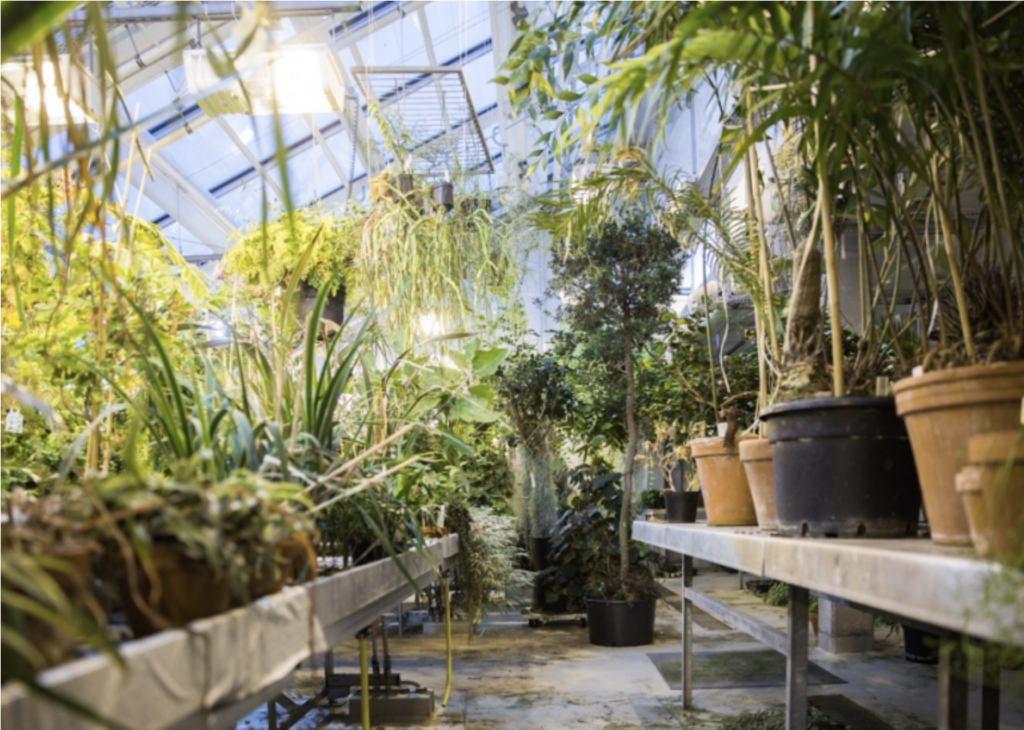Hi all,
If you’re concerned about the stability of biological nomenclature, pls consider endorsing the position in the following link:
https://docs.google.com/forms/d/e/1FAIpQLSdglMsFmgFAE1bcdnZeRUd5QeidqZO48nyBneUSQ7pKCaS2sA/viewform
Kategoriarkiv: Forskning
Early Career Systematists in Sweden mailing list
The Swedish Systematics Society (https://systematikforeningen.se/) are interested in bringing together the community of Early Career Systematists in Sweden, with the aim to organise workshops, symposia – or any event that would best benefit the Early Career community.
If you would like to receive information about such events and connect with other Early Career Systematists in Sweden, join the mailing list, here: https://rb.gy/njq41
Thank you – and hope to see you in Lund!
Aelys
Vice Chair – Swedish Systematics Society

International Botanical Congress, Madrid, July 2024
Dear colleagues,
As Chair of the International Association of Botanical and Mycological Societies (IABMS) I am trying to help spread news about preparations for the upcoming International Botanical Congress in Madrid, Spain next year. I am sending this message to representatives of numerous botanical, mycological and phycological professional societies around the world. I am hoping that you will pass this news along to your members. Apologies to IABMS member organizations who already received this message.
Planning for the International Botanical Congress is progressing rapidly and the website includes a great deal of useful information. The IBC will be in Madrid in July 2024. The list of invited speakers is very exciting with a diverse group of individuals from around the world addressing a wide range of subjects of broad interest. The list of excursions is also very exciting with a variety of one day and multi-day excursions planned.
The organizers of the IBC are now inviting submissions of abstracts for oral and poster presentations! In addition, online registration is now open with an early registration discount.
See more details on the conference website: https://ibcmadrid2024.com/index.php
Abstracts
See the guidelines for abstract preparation here and the list of 233 accepted symposia here. Prepare your abstract according to the specifications and select 1-3 symposia that are the most appropriate for your presentation. The organizers intend to have abstract acceptance decisions completed before the early registration deadline.
The abstract deadline for oral presentations is November 30, 2023
The deadline for poster abstracts is February 1, 2024.
Registration
Register now to receive the early registration discount, which expires on 29 February 2024. Registration information is found here.
If you have not already done so, I encourage you to sign up for newsletters from the IBC organizers to stay up to date on IBC news. The link for this is on the IBC homepage.
With best wishes,
Patrick Herendeen, IABMS Chair
Links for guidelines and symposia and registration:
https://ibcmadrid2024.com/index.php?seccion=scientificArea&subSeccion=abstractGuidelines
https://ibcmadrid2024.com/index.php?seccion=scientificArea&subSeccion=symposiums
https://ibcmadrid2024.com/index.php?seccion=registrationArea&subSeccion=registrationInfo
Technical problem registering for Systematikdagarna 2023
We experience a strong interest for the meeting and also that many persons are registering just before deadline. Unfortunately, it is just now impossible to register for the conference dinner. ”Not available” is indicated if you try, but this is incorrect. We still have seats for the conference dinner. I hope this problem will be solved soon. In the mean time either wait to register or send a message to the organizers that you want to attend the conference dinner. For this reason we extend the deadline for application to 2 November.
Final reminder: Join Systematikdagarna in Lund 27-28 November 2023!
Systematikdagarna is this year arranged by the Department of Biology, Lund University, in the Ecology Building, Blue Hall. You are now very welcome to register for the meeting and announce if you want to give a talk or present a poster! We have updated the information regarding keynote speakers and the workshop section. The deadline for application is 31 October.
THREE permanent positions in Helsinki
Use the links below for further information:
Curator of Vascular Plants:
Tenure track Professor of Biodiversity Change:
https://jobs.helsinki.fi/job/Helsinki-Assistantassociate-professor-in-Biodiversity-Change/780346602/
Tenure track Professor of Plant/Fungal Systematics:
https://jobs.helsinki.fi/job/Helsinki-AssistantAssociate-professor-in-plant-systematics/780342302/
Reminder: Join Systematikdagarna in Lund 27-28 November 2023!
Systematikdagarna is this year arranged by the Department of Biology, Lund University, in the Ecology Building, Blue Hall. You are now very welcome to register for the meeting and announce if you want to give a talk or present a poster! We have updated the information regarding keynote speakers and the workshop section. The deadline for application is 31 October.
Associate Professorship in Systematic and Evolutionary Botany
The Department of Ecology, Environment and Plant Sciences at Stockholm University is recruiting a tenured Associate Professor in Systematic and Evolutionary Botany. The potential research area is very broad, with teaching most likely organism-based (e.g. undergraduate botany and field-based floristics). We welcome applications also from more junior people, as long as they have some teaching experience.
Application closing date: 21 Nov 2023.
Further information and how to apply:
Swedish: https://www.su.se/om-universitetet/jobba-p%C3%A5-su/lediga-jobb?rmpage=job&rmjob=21841&rmlang=SE
Stockholm University strives to be a workplace free from discrimination and with equal opportunities for all.

Welcome to the Systematikdagarna in Lund 27-28 November 2023
Systematikdagarna is this year arranged by the Department of Biology, Lund University, in the Ecology Building, Blue Hall. You are now very welcome to register for the meeting and announce if you want to give a talk or present a poster! We have updated the information regarding keynote speakers and the workshop section. The deadline for application is 31 October.
PhD Research Fellow in Systematic Mycology
At the Natural History Museum (NHM), University of Oslo (UiO), we have a vacancy for a four-year PhD Research Fellow in Systematic Mycology, supervised by Mika Bendiksby and Charlotte Bjorå. The position includes one year of duty work (distributed over the employment period) that includes various meriting activities (e.g., teaching, specimen curation, outreach activities, and student supervision). Starting date: January 1st 2024, or as soon as possible thereafter.
This PhD opportunity allows you to engage in a self-developed and innovative systematics research project on fungi, or plants in combination with fungi. The successful candidate for this position will work in close collaboration with staff members of the ISOP research group, primarily with Mika Bendiksby and Charlotte Bjorå. In our research, we focus on the discovery, understanding, protection, and utility of fungal and plant diversity. We often use a phylogenetic approach on genomic data to study a range of biological aspects in fungi and plants, and fungarium- and herbarium specimens are important data sources and depositories in our research. An ideal project will effectively utilize NHMs fungal and/or plant collections, include fieldwork for collecting new materials, and align with our research profiles and ongoing activities. The ISOP group has a strong record for field-based research in the Arctic, Nordic countries, east- and southern Africa, and Indonesia. It is desirable that the proposed PhD project aligns well also with at least one of the research themes at our museum-wide research hub STADIS. The hub focuses on stability and discontinuity within and between different biological system levels, such as genomes, phenotypes, species, communities, and ecosystems.
For almost 200 years, specimens of fungi and plants have been collected, studied and preserved at NHM. The improvement, maintenance and use of scientific collections is central to our work. The herbarium and fungarium comprise over 1.2 million plants and 600,000 fungal specimens, of which the majority are Nordic. The museum provides excellent research facilities in-house, including various molecular- and microscopy laboratories. NHM has ten research groups that pursue research and education within basic and advanced biosystematics and biodiversity as well as geological studies.
Qualification requirements
The candidate must have:
- A degree equivalent to a Norwegian master’s (MSc) in biology. Other relevant backgrounds might be considered upon individual evaluation. For candidates not having finished their master’s degree, the thesis must have been submitted for evaluation by the closing date of the call. It is a condition of employment that the master’s degree has been awarded with at least an equivalent to grade B in the ECTS grading scale.
- The ability to work independently and in a structured manner
- The ability to cooperate with others
- Excellent communication skills (including written and spoken English)
It is preferable that the candidate has (and can document) one or more of the following competences:
- A degree equivalent to a Norwegian master’s (MSc) in systematic mycology/botany
- Knowledge and research experience with DNA-based techniques applied in biosystematics and biodiversity studies
- Experience in relevant analytical/statistical methods and bioinformatics tools (e.g., phylogenetics, R)
- Data management skills following best reproducible open science practices
- Experience with microscopy
- Ability to do field work in remote and potentially challenging environments
- Hold a driver’s license
- Experience with scientific publication and outreach
- Experience in collection-based research (using physical and/or digital specimen data)
- Strong team- and networking skills
Personal skills
We are looking for a highly motivated, creative, and structured candidate with excellent collaborative qualities. Research experience, ambitions, and potential will also count when evaluating the candidates.
We offer
- a dynamic, friendly and professionally stimulating working environment
- salary NOK 532 200 – 575 400 per annum depending on qualifications and seniority as PhD Research Fellow (position code 1017)
- membership in the Norwegian Public Service Pension Fund
- attractive welfare benefits
How to apply
The application must include the following six elements as separate documents:
- A one-page (maximum) application/cover letter with a brief account of your motivation for applying for the position
- A self-developed and innovative research project (following the template for this position provided here: template_for_project_description.docx[MB1] ; max 2 pages!
- CV (either as an attachment or filled into our electronic recruitment system)
- Transcripts and diplomas showing completion of the bachelor’s and master’s degrees, or official confirmation that the master’s thesis has been submitted
- Relevant certificates/references
- List of publications (if any), including submitted manuscripts and MSc thesis.
- The name, academic relation, and contact information for at least two reference persons, of whom one must be an advisor for the master’s thesis or equivalent thesis
The application with attachments must be delivered in our electronic recruiting system, please follow the link “apply for this job”. Foreign applicants are advised to attach an explanation of their University’s grading system. Please note that all documents should be in English (or a Scandinavian language).
For an overview of our researchers, see https://www.nhm.uio.no/english/about/organization/research-collections/index.html or contact Professor Hugo de Boer (h.de.boer@nhm.uio.no). For more information about ongoing and planned research activities in the ISOP group, please contact Professor Mika Bendiksby (mika.bendiksby@nhm.uio.no) or Associate Professor Charlotte S. Bjorå (csletten@nhm.uio.no).
In assessing the applications, special emphasis will be placed on the documented academic qualifications as well as the candidate’s motivation and personal suitability. Interviews with the best qualified candidates will be arranged.
Apply here: https://www.jobbnorge.no/en/available-jobs/job/248954/phd-research-fellow-in-systematic-mycology

